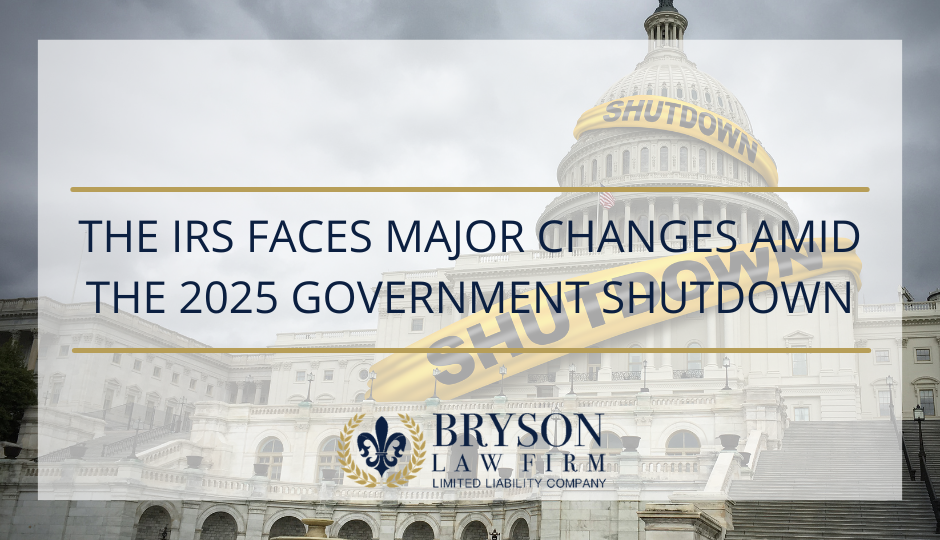
Qualifying for Innocent Spouse Relief
When you file a joint return with a spouse or ex-spouse, you receive certain tax advantages that can save you money. One of the caveats to filing jointly is that you are both 100 percent responsible for any taxes owed. However, there are instances where we can establish you’re not responsible for the taxes owed and shouldn’t be held liable to pay them.
What is Innocent Spouse Relief?
First, let’s be clear, applying for Innocent Spouse Relief is a legal issue, so it’s imperative that you involve a tax attorney at Bryson Law Firm, L.L.C. as soon as possible. You only have two years to apply for this type of relief after the IRS contacts you regarding the tax issue.
To determine if you qualify for Innocent Spouse Relief, we gather all the relevant documentation and thoroughly review it. Once we’ve examined all the facts of your case, we can discuss whether claiming Innocent Spouse Relief for you is a viable option.
There can be many dynamics involved in a relationship that can lead us to seek Innocent Spouse Relief for you. We look at whether there was any deception on your spouse’s or ex-spouse’s part, such as earning unreported income. Divorce or separation can also be a factor.
Also, if you are a victim of spousal abuse, please don’t hesitate to contact Bryson Law Firm, L.L.C.to discuss your situation. Our firm and the IRS treat these cases very seriously and hold your information in the strictest confidence from your spouse or ex. While it doesn’t guarantee Innocent Spouse Relief, spousal abuse is one factor the IRS considers when making their decision.
Claiming Innocent Spouse Relief
The IRS has strict guidelines for determining whether a person qualifies as an innocent spouse. You must meet all the criteria to be considered as an innocent spouse. First, there must be a joint return and then we have to establish that the tax understatement can be solely attributed to the other spouse or ex-spouse. Next, we must prove that you were unaware of the tax discrepancy. The IRS understands that one spouse usually manages the finances in a relationship, so you may be totally unaware of the other’s actions. Then, the IRS determines if it’s unfair to hold you liable for the other spouse’s actions.
Obviously, these steps can take considerable research to support your claim as an innocent spouse. When we state your case to the IRS, and if they disagree with our claim, we still have other options available to get you some relief from the IRS tax burden.
Separation of Liability
This option would relieve you of being responsible for the entire amount of the tax bill. In cases like these, the IRS will review the joint return in question and determine your share of the tax debts bill. To qualify for Separation of Liability status, you need only meet one of IRS’ criteria:
- You were divorced or separated at the time of filing the joint return.
- You’re widowed
- You didn’t live in the same household with the spouse on the joint return for the 12 months prior to requesting relief.
Equitable Relief
If you don’t qualify for either Innocent Spouse Relief or Separation of Liability, Equitable Relief is another option we can look at. You must meet a number of conditions for the IRS to consider applying Equitable Relief in your case, such as having no knowledge of a fraudulent return, the tax being owed by your spouse or former spouse, and, if applicable, fear of retribution from an abusive spouse. If all the criteria is met, we can present all the facts and circumstances surrounding your request to show it would be unfair to hold you liable for the actions of your current or former spouse.
Finding Relief
Any of these options can be difficult to obtain, but Bryson Law Firm, L.L.C. has had considerable success when pleading these tax cases with the IRS. Owing taxes through no fault of your own can be devastating to your finances. Fortunately, the IRS provides these allowances to provide relief to the innocent spouse.
If you believe you’ve been unfairly tied to a spouse’s or ex-spouse’s tax bill, we’re here to help — whether you’re in Louisiana, Texas, Alabama, or anywhere across the nation. Call or click to set up a free initial consultation with one of our tax attorneys to see if you qualify for Innocent Spouse Relief.























